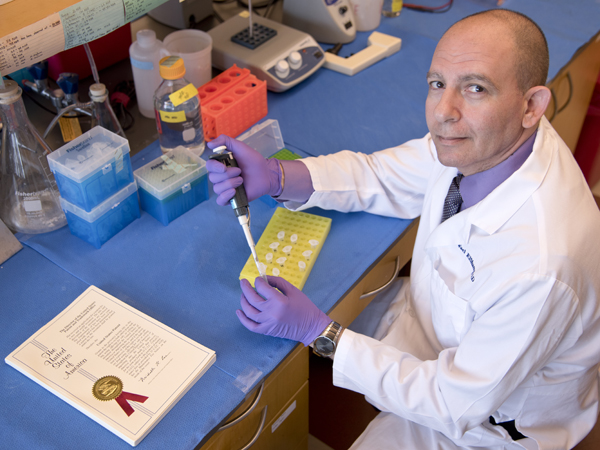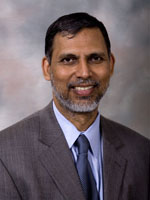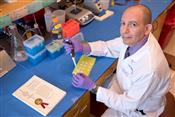Research yields possible new cancer therapy

Published in News Stories on August 20, 2015
Dr. Wael ElShamy's quest to cure cancer now includes a patent.
The patent covers a method to diagnose and treat several types and subtypes of cancer. It has worked in the lab on triple negative breast cancer samples and ElShamy is working to get it to clinical trial for patients.
The patent covers several cancers that overexpress, or have too much, geminin and a protein called c-Abl in the cell nucleus. Drugs already approved for use against one cancer can keep the nuclear c-Abl from enabling overexpressed geminin. Too much geminin promotes tumor growth. When geminin levels fall, the cancer growth stops and cancer cells die.
"Geminin overexpression is seen in several aggressive cancers," said ElShamy, associate professor of biochemistry and director of the UMMC Cancer Institute's Molecular Cancer Therapeutics Program. "Geminin overexpression converts normal cells to cancer cells."
The key was in finding what activated the overexpressed geminin to act as a tumor inducer. He found the errant message-sender in a protein called c-Abl. This protein can exist outside or inside a cancer cell nucleus. ElShamy found that when it's outside the nucleus, it had little effect on geminin. When he found it inside the nucleus, geminin was always overexpressed.
His patent covers c-Abl inhibitor use in therapies for breast, liver, ovarian, colon, brain, lung and prostate cancer. "The patent licenses the idea for us," ElShamy said. If a patent generates payment, it helps support research at the Medical Center.
The patent is exciting, but ElShamy is more enthusiastic about work to start a clinical trial to test the idea in triple negative breast cancer patients.

Vijayakumar
"His findings are key to offering more personalized medicine for our patients," said Dr. Srinivasan Vijayakumar, Cancer Institute director. "Cancer is a devious disease in which some people respond to a medication and others don't. Dr. ElShamy has found a molecular key, a biomarker, that will enable doctors to view cancer cells under a microscope and know a particular medication likely will help those who have nuclear c-Abl, but won't benefit those who don't."
Biomarkers - such as genes and their product proteins - act as flags to help identify subtypes of cancers.
"That will bring the cost way down and will bring the anguish way down," ElShamy said. "If you stratify patients by who will respond and who will not respond before you start them on trial, you can save patients that agony of wondering if this drug will work."
ElShamy started this search more than a decade ago with triple negative breast cancer cells. He found about half of 800 tumor samples tested had geminin overexpressed and c-Abl in the cells' nuclei.
Further work showed the drug imatinib mesylate targets the c-Abl protein and stops geminin overexpressing cancer growth. If the cancer cell nucleus had no c-Abl the drug, already FDA approved for some leukemia therapies, didn't work to halt cancer. In his lab, he found when c-Abl was in the nucleus and geminin was overexpressed, imatinib mesylate halted about 80 percent of the cancers.
ElShamy, the Dr. Lawrence and Mrs. Bo Hing Chan Tseu American Cancer Society Research Scholar, pursued this research with a $720,000 grant from the ACS funded by Dr. Lawrence Tseu, a Hawaiian dentist, and his late wife, Mrs. Bo Hing Chan Tseu.
While his focus initially was on triple negative breast cancers, an aggressive breast cancer that tends to affect younger women and African American women, ElShamy also found the nuclear c-Abl in the other cancers.

The UMMC Cancer Institute seeks to provide the highest quality of cancer care, educate medical caregivers and our population about cancer, and find a cure for cancer. The UMMC Cancer Institute, with members from four universities and research cores on the UMMC campus in Jackson, MS and the University of Mississippi campus in Oxford, MS, is part of the state's only academic medical center and is a member of national and international collaborative programs. For more information, visit www.umc.edu/cancerinstitute or call 1-601-815-6801.
Photos
 |
High Resolution Medium Resolution Low Resolution |


